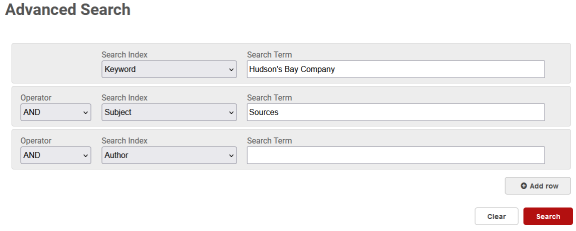When researching a new topic, it's often important to start by gaining an overview, understanding unfamiliar terms, obtaining brief factual information, and testing your own assumptions. The resources listed below offer background and context for studying the early history of Canada and imperialism.
Open Resources
UNB Libraries' Resources
-
Oxford Companion to Canadian History, The
This indispensable new guide to Canadian history is comprehensive, authoritative, and--above all--companionable. The essential guide to the significant events, issues, institutions, people, and places that have shaped Canadian life from earliest times to the late twentieth century. In more than 1,700 entries, the country's leading historians describe and analyze events in political, military, social, economic, cultural and intellectual history, drawing on the latest scholarship.
Collection limited to subscribed 5-user access -
Historical Dictionary of European Imperialism
[HIL-REF D217 .H57 1991]
Christopher Columbus' discovery of the new world launched a process of economic and cultural integration that continues to this day. In the wake of Columbus's voyages, the major powers of Western Europe established imperial systems that shaped global politics and economics for centuries. "The Historical Dictionary of European Imperialism" is designed to provide a ready reference tool for students and scholars of these systems. Its major focus is the Spanish, Portuguese, British, Dutch, French, German, Belgian, and Italian empires during the past 500 years.
-
The Cambridge History of the Native Peoples of the Americas, Part1 (Vol.1)
This book provides the first comprehensive history of the native peoples of North America from their arrival in the western hemisphere to the present.
Purchased multi-user unlimited access -
The Oxford history of the British Empire
[HIL-REF DA16 .O95 1998 vols. 1-5]
The first two volumes of this five-volume history of the British Empire establish a very high standard of scholarship. Over three dozen scholars examine both major and minor aspects of the modern imperial experience. The chronological focus develops from the 16th century, when Ireland was the starting point of the empire, to the end of the 18th, when the 13 American Colonies were lost. The essays form an interlocking analysis of the origins of empire from an intellectual, military, economic, and technological perspective. There is some overlap; for example, several essays discuss the role of naval power, but each author approaches the topic with a different focus, such as technology in N.A.M. Rogers's essay and politics in John Appleby's. The various chapters, therefore, reinforce the overall picture instead of being redundant. Separate chapters in the first volume analyze the origins and implementation of the British imperial expansion, or contraction, in each region and then continue in the second volume, as do discussions of new subjects, such as the colonization of Australia. The interrelationship between the mother country and the Colonies also receives continued emphasis. Jonathan Israel's chapter, in Volume 1, on the continental perspective of British empire building helps place events in an even broader context. There is a short bibliography after each chapter. Three following volumes will see the empire through to its 20th-century decline. Recommended for all libraries.Frederic Krome, Jacob Rader Marcus Ctr. of the American Jewish Archives, Cincinnati Copyright 1998 Cahners Business Information, Inc. From: Reed Elsevier Inc. Copyright Reed Business Information
-
The Cambridge history of the British empire
[HIL-REF DA30 .C3 1929 v.6]
-
Princeton companion to Atlantic history
[HIL-REF D210 .P936 2015]
"Between the fifteenth and nineteenth centuries, the connections among Africa, the Americas, and Europe transformed world history--through maritime exploration, commercial engagements, human migrations and settlements, political realignments and upheavals, cultural exchanges, and more. This book, the first encyclopedic reference work on Atlantic history, takes an integrated, multicontinental approach that emphasizes the dynamics of change and the perspectives and motivations of the peoples who made it happen. The entries--all specially commissioned for this volume from an international team of leading scholars--synthesize the latest scholarship on central themes, including economics, migration, politics, war, technologies and science, the physical environment, and culture. Part one features five major essays that trace the changes distinctive to each chronological phase of Atlantic history. Part two includes more than 125 entries on key topics, from the seemingly familiar viewed in unfamiliar and provocative ways (the Seven Years' War, trading companies) to less conventional subjects (family networks, canon law, utopias)."--Publisher's description.
-
Biographical Dictionary of Enslaved Black People in the Maritimes
This biographical dictionary recovers the stories and illuminates the lives of enslaved Black people in the Maritimes.
-
Canada's diverse peoples : a reference sourcebook
[HIL-REF FC104 .B86 2003]
Born in the U.S. to European immigrants, Bumsted (history, U. of Manitoba) immigrated to Canada 40 years ago as a young adult, and is married to a Welsh immigrant. He has written numerous books and articles on Canadian history. His chronologically- organized reference text describes the gradual shifting of the origins of Canada's immigrants from a few western European countries to the entire spectrum of the Third World, and concludes with diversity issues and situations faced by Canadians during recent decades. Suitable for the general public and students of Canadian history, sociology, and anthropology. Annotation #169;2004 Book News, Inc., Portland, OR (booknews.com) Distributed by Syndetic Solutions, Inc.
-
Historical atlas of Canada
see also [HIL-REF G1116 .S1 H58 1987 vols. 1-3]With the other two volumes of the atlas, it presents a splendid visual record of the roots of our society and the evolution of the intensely regional, culturally diverse nation we know today.
-
Oxford Dictionary of National Biography (ODNB)
Oxford Dictionary of National Biography is an illustrated/fulltext reference tool providing 55,000 specially-written signed biographies of the men and women who shaped all aspects of the British past from the earliest times to the end of the year 2000. It is the product of research instituted at the University of Oxford and funded by the British Academy and by Oxford University Press. It is the achievement of 10,000 contributors and advisers staff in Oxford. The Oxford DNB aims to provide full, accurate, concise, and readable articles on noteworthy people in all walks of life. No living person is included: the Dictionary's articles are confined to people who died before 31 December 2000.
-
Dictionary of Canadian military history
[HIL-REF FC226 .B47 1992]
A single-volume reference work containing information on all aspects of the Canadian military.




